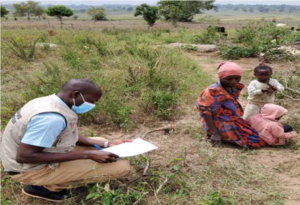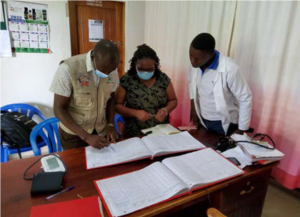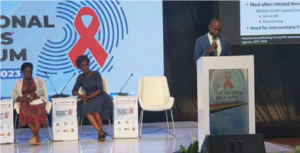Recover your password.
A password will be e-mailed to you.
 |
Dr. Peter Chris KawungeziMBChB (MUK), MPH (MUST) Host Site: The AIDS control program (ACP), Ministry of Health
|
||||
ABOUT THE FELLOWNow an accomplished field epidemiologist, Peter Chris holds a Master’s degree in Public health and a Bachelors degree in Human Medicine and Surgery. Peter has interest in HIV, maternal, and child health, global security and One Health. During the fellowship, he was attached to the AIDS control program (ACP) under the department of National disease control, Ministry of Health. Through the in-service training he has attained skills in programming, monitoring and evaluation, support supervision and mentorship, reporting performance against targets, media reporting, outbreak investigation, and response, conducting quality improvement projects, budgeting and accountability, financial lobbying skills, surveillance data analysis, interpretation, and utilization. Achievements at the Host Site
Fellowship program specific achievementsSurveillance Data Analysis
Epidemiological Study
HIV-Study
Quality Improvement Project
Newspaper Articles (03)
Response to Public Health Emergencies
Conference Presentations Presented at five local conferences and four international conferences
– 1 poster Workshop facilitator
Bulletin Articles
Mentorship of FETP-Frontline Tier Trainees
Publication in Peer-Reviewed Journals
Ebola Handbook Writing
Summary of Epidemiological Study:Title: Predictors of exclusive breastfeeding for six months among HIV-exposed infants in Uganda: Insights from a prospective cohort study, 2017–2019 Background: Exclusive breastfeeding is recommended for HIV-exposed infants (HEIs) for six months to lower the risk of mother-to-child HIV transmission and enhance HIV-free survival. We estimated the predictors of exclusive breastfeeding (EBF) for 6 months in mothers receiving routine prevention of mother-to-child HIV transmission (PMTCT) care in Uganda. Methods:We analyzed secondary data from a prospective cohort study of Uganda’s PMTCT impact evaluation, conducted at 152 randomly-selected public and private facilities during 2017-2019. Health facilities offering PMTCT services are stratified into higher-level (Level IV centers and hospitals, which deliver comprehensive health care), and lower-level (Level I to III centers, which offer more limited services). HEIs were defined as infants born to HIV-positive mothers who tested HIV-negative at baseline. Mother-HEI pairs were recruited ≤3 months postpartum and followed at 6, 9, 12, 15, and 18 months. Baseline data included the HEIs’ and mothers’ HIV status; follow-up data included infant feeding practices. We excluded HEIs with missing feeding data at 6 months. Multivariate modified Poison regression was used to determine predictors of EBF for six months. Results: Among 1,527 eligible HEIs, 767 (50%, 95%CI 48-53%) were male, 464 (30%, 95%CI 28- 32%) were exclusively breastfed for six months, and 310 (20%, 95%CI 18-22%) of their mothers received PMTCT services at a higher-level facility. Among 1,013 mothers with data, 890 (88%, 95%CI 86-90%) were virally suppressed at baseline. Of 1,278 mothers with data, 205 (16%, 95%CI 14-18%) disclosed their HIV status to their spouses. Having a mother who was virally suppressed (aRR=2.1, 95%CI 1.2-3.8), disclosed her HIV status to her spouse (aRR=1.4, 95%CI 1.0-2.0), and received PMTCT at a higher-level health facility (aRR=1.4, 95%CI 1.1- 1.9) were associated with increased likelihood of receiving EBF for 6 months among HEIs. Conclusion: HEI six-month EBF rates were low. Factors that have been previously associated with adherence to ART (viral suppression, disclosing status to spouses) were also associated with EBF for 6 months. Further investigation is needed to understand the reasons for the higher likelihood of EBF among mothers who are virally suppressed, disclose HIV status to spouses, as well as attend PMTCT at higher-level facilities. Key lessons learnt during the fellowship
|
|||||
|
|
|
|
|
|




